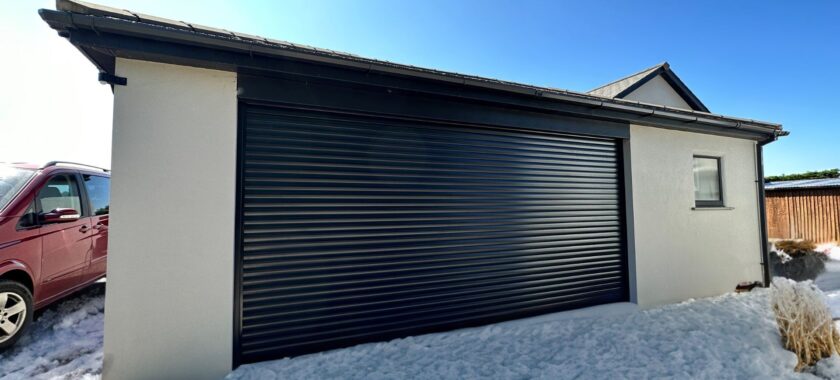Your garage door is one of the most important parts of your home. It protects your car, belongings, and family from the elements, intruders, and pests. But did you know that your garage door can also be vulnerable to rust? Rust is a common problem that affects many garage doors, especially those made of metal. Rust can damage the appearance, functionality, and durability of your garage door, and even pose a safety hazard. That’s why it’s essential to rust-proof your garage door and keep it in good condition.
In this article, we will show you how to rust-proof your garage door using the best materials and products available. We will also explain how rust affects your garage door and how to avoid it in the first place. Finally, we will provide you with a comprehensive guide to rust-proofing your garage door, from preparation to maintenance. By following these steps, you will be able to extend the life of your garage door and prevent costly garage door repair services.
Whether you need a garage door repair Red Deer or just want to improve the look and performance of your garage door, this article is for you. Read on to learn everything you need to know about rust-proofing your garage door.
The Best Materials and Products for Rust-Proofing Your Garage Door
One of the first steps to rust-proofing your garage door is choosing the right materials and products. Not all garage doors are made equal, and some are more prone to rust than others.
Here are some of the best materials and products for rust-proofing your garage door:
- Galvanized steel: This is a type of steel that has been coated with a layer of zinc to prevent rust. Galvanized steel is one of the most popular and durable materials for garage doors, as it can withstand harsh weather conditions and resist corrosion. However, galvanized steel can still rust if the zinc coating is damaged or worn out, so it needs regular inspection and maintenance.
- Aluminum: This is a lightweight and rust-resistant metal that is often used for garage doors. Aluminum is easy to install and operate, and it can also be painted or customized to suit your preferences. However, aluminum is not as strong as steel, and it can dent or scratch easily. Aluminum also tends to fade over time, so it needs periodic repainting or refinishing.
- Fiberglass: This is a synthetic material that is made of glass fibers and resin. Fiberglass is a versatile and flexible material that can mimic the appearance of wood, metal, or other materials. Fiberglass is also resistant to rust, rot, and insects, and it can withstand temperature changes and moisture. However, fiberglass is more expensive than metal, and it can crack or break under extreme pressure or impact.
- Rust-proof paint: Rust-proof paint contains anti-corrosion additives, which protect metal surfaces from rust. It can be applied to any metal surface, such as steel or aluminum, and is available in various colors and finishes. However, rust-proof paint can chip or peel off over time, so it needs regular touch-ups and recoating.
- Rust-proof undercoating: This is a type of coating that is sprayed or brushed on the underside of your garage door to protect it from rust. Rust-proof undercoating can seal the gaps and cracks that may allow water or dirt to enter your garage door, and it can also reduce noise and vibration. Rust-proof undercoating can be used on any metal surface, but it is especially effective on galvanized steel. However, rust-proof undercoating can be messy and difficult to apply, and it may require professional installation.
These are some of the best materials and products for rust-proofing your garage door. By choosing the right ones for your garage door, you can prevent rust and extend the life of your garage door. However, these materials and products are not enough to keep your garage door rust-free. You also need to follow some tips and tricks to avoid rust and maintain your garage door properly.
How Rust Affects Your Garage Door and How to Avoid It
Rust is a chemical reaction that occurs when metal is exposed to moisture and oxygen.
Rust can affect your garage door in many ways, such as:
- Reducing the strength and durability of your garage door: Rust can weaken the metal and make it more prone to bending, breaking, or cracking. This can compromise the security and functionality of your garage door, and even cause injuries or accidents.
- Damaging the appearance and value of your garage door: Rust can create unsightly stains, spots, or patches on your garage door, and ruin its aesthetic appeal. This can lower the value of your garage door, and even affect the curb appeal of your home.
- Increasing the maintenance and repair costs of your garage door: Rust can cause your garage door to malfunction, jam, or squeak, and require more frequent lubrication, cleaning, or adjustment. This can increase the maintenance and repair costs of your garage door, and even shorten its lifespan.
To avoid these problems, you need to prevent rust from forming on your garage door in the first place. Here are some tips to avoid rust on your garage door:
- Choose a rust-resistant material or product for your garage door: As we discussed in the previous section, some materials and products are more resistant to rust than others. Choose a garage door that is made of galvanized steel, aluminum, fiberglass, or other rust-proof metal, or apply a rust-proof paint or undercoating to your existing garage door.
- Keep your garage door clean and dry: Dirt, dust, salt, or other contaminants can accelerate the rusting process, so you need to keep your garage door clean and dry. Wash your garage door regularly with mild soap and water, and wipe it dry with a soft cloth. Avoid using abrasive cleaners or tools that can scratch or damage the metal surface. Also, check for any leaks or drainage issues in your garage that can cause water to accumulate on your garage door.
- Inspect and repair your garage door regularly: Even if you have a rust-proof garage door, you still need to inspect and repair it regularly to prevent any damage or wear and tear. Look for any signs of rust, corrosion, or deterioration on your garage door, and fix them as soon as possible. You can use sandpaper, steel wool, or a wire brush to remove any minor rust spots, and then apply a primer and a fresh coat of rust-proof paint. For major rust damage, you may need to replace the affected parts or the entire garage door. If you are not sure how to do it yourself, you can always contact a professional garage door repair service.
By following these tips, you can avoid rust on your garage door and keep it in optimal condition. However, if you already have rust on your garage door, you need to know how to rust-proof it effectively.

A Comprehensive Guide to Rust-Proofing Your Garage Door: From Preparation to Maintenance
If you already have rust on your garage door, you need to know how to rust-proof it effectively. Rust-proofing your garage door is not a difficult task, but it requires some time and effort. Here are the steps to rust-proofing your garage door, from preparation to maintenance:
- Preparation: Before you start rust-proofing your garage door, you need to prepare the tools and materials you will need. You will need a wire brush, sandpaper, steel wool, or a grinder to remove the rust; a primer, rust-proof paint, and a paintbrush or a roller to apply the coating; masking tape, a drop cloth, and newspaper to protect the surrounding areas; and a ladder, a screwdriver, and a wrench to access and detach the garage door parts. You will also need to wear protective gloves, goggles, and a mask to avoid inhaling dust or fumes.
- Removal: The next step is to remove the rust from your garage door. You can do this by using a wire brush, sandpaper, steel wool, or a grinder to scrape off the rust from the metal surface. You need to be careful not to damage the metal or the zinc coating if you have a galvanized steel garage door. You also need to remove any dirt, grease, or paint residue from the garage door, using a mild detergent and water. Then, you need to rinse and dry the garage door thoroughly, using a soft cloth or a towel.
- Coating: The final step is to apply the rust-proof coating to your garage door. You can do this by using a primer, rust-proof paint, and a paintbrush or a roller. You need to follow the instructions on the product label and apply the coating evenly and smoothly. You also need to cover the surrounding areas with masking tape, a drop cloth, and a newspaper, to avoid staining or dripping. You may need to apply two or more coats of the coating, depending on the product and the condition of your garage door. You also need to wait for the coating to dry completely, before reattaching or operating your garage door.
- Maintenance: After you have rust-proofed your garage door, you need to maintain it regularly to prevent rust from recurring. You can do this by cleaning your garage door periodically, using a mild soap and water, and wiping it dry. You also need to inspect your garage door for any signs of rust, corrosion, or damage, and repair them promptly. You also need to lubricate your garage door hinges, springs, and rollers, using a silicone-based lubricant, to prevent friction and wear. You also need to avoid scratching or denting your garage door, as this can expose the metal to moisture and oxygen.
By following these steps, you can rust-proof your garage door and keep it in excellent condition. However, if you are not confident or comfortable with doing it yourself, you can always hire a professional garage door repair service to do it for you.
Conclusion
You have learned how to rust-proof your garage door using the best materials and products available. You have also learned how rust affects your garage door and how to avoid it in the first place. Finally, you have learned how to rust-proof your garage door, from preparation to maintenance. By following these tips and steps, you can protect your garage door from rust and keep it in great condition.
However, if you need any help or assistance with rust-proofing your garage door, you can always contact Iceberg Overhead Doors. We are a professional garage door repair service that serves Red Deer and the surrounding areas. We can provide you with expert advice, quality workmanship, and affordable prices for all your garage door needs. Whether you need commercial garage door repair or residential garage door repair, Iceberg Overhead Doors can handle it for you.
ree estimate for your garage door panel repair or garage door panel replacement.
Frequently Asked Questions
How often should I rust-proof my garage door?
Rust-proof your garage door annually or more often if you notice signs of rust. Factors affecting frequency include type, quality, climate, and usage.
What are the benefits of rust-proofing my garage door?
Rust-proofing your garage door has many benefits, such as:
– Improving the appearance and value of your garage door and your home
– Enhancing the security and functionality of your garage door-
– Reducing the maintenance and repair costs of your garage door
– Extending the lifespan of your garage door
– Preventing injuries or accidents caused by a faulty garage door
How much does it cost to rust-proof my garage door?
Rust-proofing your garage door is a cost-effective investment that is much cheaper than repairing or replacing a rusted garage door. Costs depend on factors such as size, condition, materials, and labor fees.









